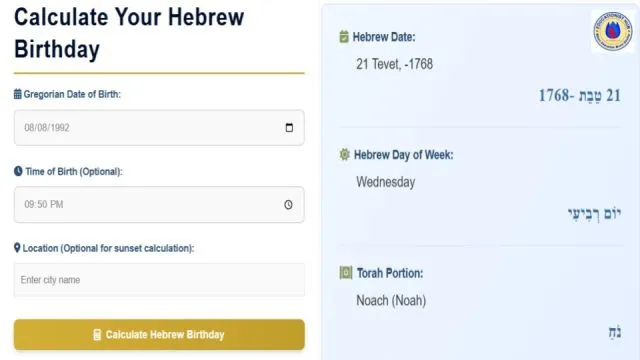Jewish Birthday Calculator
Discover your Hebrew birthday, Torah portion, and the spiritual significance of your special day according to Jewish tradition
Calculate Your Hebrew Birthday
Note: The Hebrew day begins at sunset. If you were born after sunset, your Hebrew birthday is the following day. For precise calculations near sunset, please provide your birth location.
About Hebrew Birthdays
In Jewish tradition, your Hebrew birthday (not your Gregorian one) holds special spiritual significance. The Hebrew calendar, also known as the Jewish calendar, is a lunisolar calendar used for Jewish religious observances.
Your Hebrew birthday determines important life events such as your Bar or Bat Mitzvah (coming of age at 12 for girls and 13 for boys). Many Jews celebrate both their Gregorian and Hebrew birthdays, but religious milestones are always calculated according to the Hebrew date.
This Hebrew birthday calculator helps you discover your true birth date according to the Jewish calendar, your weekly Torah portion (Parashat HaShavua), and the spiritual meaning associated with your birth date.
How It Works
Our Jewish birthday calculator uses sophisticated algorithms based on the traditional Hebrew calendar system to convert Gregorian dates to Hebrew dates with precision.
Here’s the process:
- Enter your Gregorian birth date (required)
- Optionally add your birth time and location for sunset adjustment
- We calculate the corresponding Hebrew date
- We determine the Torah portion read on the Shabbat of your birth week
- We provide insights into the significance of your Hebrew birthday
The Hebrew calendar differs from the Gregorian calendar in that it follows the moon’s cycles with periodic adjustments to synchronize with the solar year. This is why Hebrew dates shift each year relative to the Gregorian calendar.
Frequently Asked Questions
In Jewish tradition, your Hebrew birthday is spiritually significant. It’s considered an auspicious time for prayer, reflection, and personal growth. Many believe it’s a day when your spiritual energy is renewed, and some have the custom to study the Torah portion of their birth week annually.
At age 13, Jewish boys become Bar Mitzvah (“son of the commandment”), meaning they take on adult religious responsibilities. For girls, this transition happens at age 12 (Bat Mitzvah). These ages are always calculated according to the Hebrew calendar, not the Gregorian calendar.
The Hebrew calendar is lunisolar, based on both the moon’s cycles and the solar year, while the Gregorian is purely solar. Hebrew months have 29 or 30 days, and leap years have an extra month (Adar II) to synchronize with seasons. This results in Hebrew dates shifting each year relative to Gregorian dates.
This tradition comes from Genesis: “And there was evening, and there was morning—the first day.” Jewish days begin at nightfall (when at least three stars are visible). This affects birth dates – a baby born after sunset has the next day’s Hebrew date.
This refers to the weekly Torah portion (Parashat HaShavua) that was read on the Shabbat during the week of your birth. Some believe this portion carries special meaning for your life journey. Our calculator identifies your unique Torah portion based on your Hebrew birth date.
Our calculator follows traditional Jewish calendrical rules. For dates after 1582 (when the Gregorian calendar was adopted), it’s extremely accurate. For dates before 1582, it uses the Julian calendar conversion.
Since Hebrew dates change at sunset, knowing your exact birth time and location allows us to calculate precisely when sunset occurred at your birthplace. This is especially important if you were born near sunset to determine the correct Hebrew date.
Yes! Simply enter your child’s birth date, and we’ll show their Hebrew birth date. Add 12 years for girls or 13 years for boys to determine their Hebrew coming-of-age date. The Bar/Bat Mitzvah is typically celebrated on the Shabbat following their Hebrew birthday.
The Hebrew calendar adds a leap month (Adar II) 7 times every 19 years. If you were born during a leap year, your birthday is celebrated in Adar II. If you were born in Adar during a regular year, there’s debate whether to observe it in Adar I or Adar II during leap years.
Hebrew birthday celebrations often include religious elements like giving extra charity, studying Torah, and reflecting on personal growth. Some have the custom to be called to the Torah on the Shabbat following their birthday. Traditional foods might include round challah symbolizing the cycle of life.
More Helpful Calculators
Also Checkout our collection of useful time and date calculators:
Weeks From Today Calculator
Calculate how many weeks until a future date or since a past date
Calculate WeeksHours Ago Calculator
Determine exactly how many hours have passed since a specific time
Calculate Hours Ago
Created by Sadiq Saleem | Reviewed by Team TheEducationistHub
